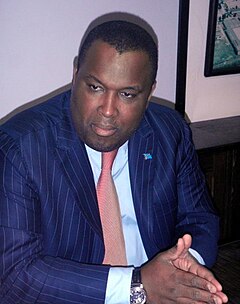Unified Lumumbist Party is a political party in the Democratic Republic of the Congo. The party's name comes from Patrice Lumumba, the first prime minister of Congo after its independence in 1960 from the Belgian colonial empire.

François-Joseph Mobutu Nzanga Ngbangawe is a Congolese politician. A son of the long-time President Mobutu Sese Seko, he served in the government of the Democratic Republic of the Congo under President Joseph Kabila from 2007 to 2011, initially as Minister of State for Agriculture and subsequently as Deputy Prime Minister for Basic Social Needs. He was dismissed from the government in March 2011.

The Government of the Democratic Republic of the Congo is the second institution in the central executive branch of the Democratic Republic of the Congo, the first institution being the President, who has the title of head of state.
Antipas Mbusa Nyamwisi is a politician and former rebel leader in the Democratic Republic of the Congo. He leads the Forces for Renewal political party and was Minister of Decentralization and Urban and Regional Planning until September 2011 when he resigned to run for president. He was previously the Minister of Foreign Affairs from 2007 to 2008.

Denis Kalume Numbi is a general and a politician in the Democratic Republic of the Congo (DRC). He was part of the Antoine Gizenga government as Minister of State for the Interior, Decentralization and Security. He was replaced in this position on 26 October 2008 by Celestin Mbuyu Kabango when the government headed by Adolphe Muzito was formed.
Emile Christophe MOTA NDONGO is the former minister of Agriculture, livestock and fishery of the Democratic Republic of Congo. he is also the acting president of Regional Fisheries Commission of the Gulf of Guinea, COREP. He is also a member of the national parliament of the Democratic Republic of the Congo. and the former chief of cabinet of the late president of the Congo, Laurent-Désiré Kabila. He was born on the 5 May 1956 in the Katanga province.
Martin Kabwelulu Labilo is a politician in the Democratic Republic of the Congo. He is a member of the Parti Lumumbiste Unifié (PALU). He was appointed Minister of Mines on 5 February 2007 in the government led by Antoine Gizenga, and retained this post through the reshuffle of 25 November 2007.
Georges Minsay Booka is a politician in the Democratic Republic of the Congo. He was Minister of Justice in the first and second cabinets of the Gizenga government, from February to November 2007.
Emile Bongeli Yeikelo Ya Ato is a politician in the Democratic Republic of the Congo (DRC). In the first cabinet of Adolphe Muzito, from October 2008 to February 2010, he was Deputy Prime Minister for Reconstruction.
Symphorien Mutombo Bakafwa Nsenda is a politician in the Democratic Republic of the Congo. In October 2008 he was appointed Deputy Prime Minister for Security and Defense in the first Adolphe Muzito cabinet.
Emmanuel-Janvier Luzolo Bambi Lessa is a politician in the Democratic Republic of the Congo. He was appointed Minister of Justice in the Muzito cabinet in October 2008.
Louis Alphonse Daniel Koyagialo Ngbase te Gerengbo was a Congolese politician. He was appointed Deputy Prime Minister of the Democratic Republic of the Congo with responsibility for the Ministry of Postal Services, Telephones, and Telecommunications in the second cabinet of Prime Minister Adolphe Muzito and became Acting Prime Minister on 6 March 2012, following the resignation of Prime Minister Muzito.
Norbert Nkulu Mitumba Kilombo is a politician in the Democratic Republic of the Congo. In the first cabinet of Prime Minister Antoine Gizenga, formed on 5 February 2007, he was named Minister of State to the President of the Republic. He retained this position in the Gizenga's second cabinet, announced on 25 November 2007.
Sylvain Ngabu Chumbu is a politician in the Democratic Republic of the Congo who was briefly Minister of State for Higher Education and Universities in 2007.

Marie-Ange Lukiana Mufwankolo, born Mufwankolo, is a politician from the Democratic Republic of Congo. She is the Minister of Gender, Women and Children in the Government Muzito II and also in the government of Muzito III since 11 September 2011.
Colette Tshomba Ntundu, from Lomami, is a journalist, academician and politician in the Democratic Republic of Congo. She was appointed Deputy Minister of Foreign Congolese Abroad in the Gizenga government from February 6, 2007 and maintained this position after the reshuffle and in the later Muzito government.







